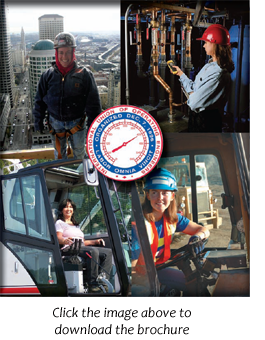Women & Apprenticeship...
A Winning Partnership!
What Is Apprenticeship?
Apprenticeship is a combination of on-the-job training and related classroom instruction in which paid employees learn the practical and theoretical aspects of a highly skilled occupation. Apprenticeship is industry-based career training, meaning the industry determines the skills its employees will need and trains people to achieve that relevant knowledge.
 Apprentices work for actual employers under the supervision of skilled workers known as journeypersons. Apprenticeships usually range from three to four years, depending on the skills and technical knowledge required in an occupation.
Apprentices work for actual employers under the supervision of skilled workers known as journeypersons. Apprenticeships usually range from three to four years, depending on the skills and technical knowledge required in an occupation.
Apprentice wages are paid on a predetermined schedule that progressively increases during the term of apprenticeship. Increases occur with satisfactory progress in both related instruction and on-the-job training until wages reach the journeyperson level. Journey level wages average 35% higher than comparable non-union wages and provide a retirement and health care package unmatched by the non-union sector.
An apprentice who successfully completes a registered apprenticeship program will receive a Certificate of Completion from the U.S. Department of Labor, Employment and Training Administration, Office of Apprenticeship, or a federally-approved State Apprenticeship Agency. Some registered programs also have dual accreditation through post-secondary institutions which apply credit for apprenticeship completion toward an Associate Degree.
Who Sponsors Apprenticeship?
Apprenticeship programs are sponsored and operated on a voluntary basis by partnerships between employers
and labor unions, employers or employer associations. Sponsors oversee every aspect of these programs, from planning to actual administration.
Apprenticeship programs are registered with the U.S. Department of Labor, Employment and Training Administration, Office of Apprenticeship or a federally-approved State Apprenticeship Agency. Industry program sponsors determine job training standards, related instruction, wages, safety and health conditions according to federal guidelines and industry needs.
What Are The Qualifications?
Each registered apprenticeship program sponsor establishes the minimum, job-related qualifications for entry into a program. Qualifications usually cover at least three areas: education, aptitude, and physical ability to perform essential occupational functions with/without reasonable accommodations. Many programs require solid math and science skills. All applicants and apprentices are treated equally throughout the recruitment, selection, employment and training process without regard to race, religion, sex or national origin.
Why Apprenticeship?
In today’s economy, most families have both spouses working to survive financially. By exploring a registered apprenticeship in the Operating Engineers, you have the opportunity to build a solid foundation that will lead to a satisfying career. You will be offered a challenge with good pay and benefits while you learn your craft.
Apprenticeship offers you a chance to excel beyond what you think you can do. A career in a non-traditional field like construction and the Operating Engineers will give you a chance to earn while you learn a hands-on trade that will benefit you and your family. Opportunities are virtually unlimited when it comes to career choices with the Operating Engineers.